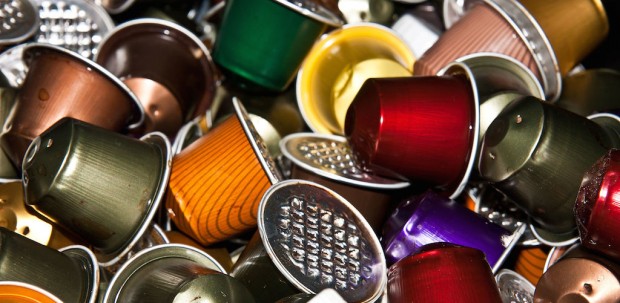There’s a reason an anti-capsule campaign would state that the number of discarded capsules in a given year could circle the earth 10.5 million times. As simple humans, we need the visual to comprehend such enormity. We need to see the problem.
In the single-serve capsule segment, which maintains an incredible market share even if recent reports suggesting its growth may be leveling off bear out, one of the most pressing growth “problems” has been environmental sustainability. Players within the segment have made notable attempts to respond to this problem — if viewed most callously, it is a problem of consumer perception that could negatively affect sales — by offering more sustainable solutions such as pods with various levels of biodegradability, or by offsetting portions of their own carbon footprint in other areas.
But what if consumers really don’t care about the sustainability of their pods? What if they simply don’t want to see the problem? Those are the somewhat frightening questions posed by a new study from the motivation-research firm MotivIndex suggesting that not only does but a small portion of single-serve consumers care about sustainability, they only care about it insofar as they can see their own trash piling up.
With offices in Boston and Toronto, MotivIndex is a private research firm that purports to offer a unique research method that digs deeper into what motivates potential buyers of products to buy or not to buy, while removing subject bias. For its single-serve study, the firm analyzed 3,800 consumers in the United States. The group suggests its research debunks the findings of other market researchers that suggest consumers truly care about sustainability and are seeking single-serve products with sustainable solutions.
“So every SSC manufacturer invests millions in not just building sustainable solutions but also in communicating their plans to their consumers,” a PR professional from the firm McCoin & Smith Communications Inc. said in an email to us on behalf of the company. “Yet, many see a decline in sales and they attribute it to their sustainability problems.”
The reason why, MotivIndex suggests based on its study, is that most consumers don’t actually care that much. Here are some key findings presented to us by MotivIndex:
- 25 percent of consumers in the single-serve category are influencing another 65 percent to drive the adoption of new systems. People in that 25-percent influencer group are primarily driven by social pressure.
- However, that social pressure isn’t coming from media reports regarding the sustainability — or lack thereof — surrounding pods, or from “fringe populations that hate” the segment, but rather from the fact that “they can visibly see the impact of their consumption as the coffee pods start to accumulate in the recycling trash bins.”
- When the pods are not visible in the trash or recycling bin, people care less.
There are a number of ways a coffee company can take this. According to the email shared with us, one reasonable conclusion would be to follow the old adage “out of sight, out of mind.”
“Simply create a disposal (recycling) system that resembles an office document shredder,” MotivIndex suggested. “You throw your docs in there, you can’t see what’s in it…it’s locked [sic]. Manufacturers could eliminate much of the negative sustainability discussions simply by making consumption less visible.”
That would be one way to go.
Nick Brown
Nick Brown is the editor of Daily Coffee News by Roast Magazine.
Comment
2 Comments
Comments are closed.







Really , their solution is “out of sight , out of mind ” . I wonder where the 3800 people they surveyed were located. I am certain it was not in socially responsible cities such as San Francisco, Seattle, Portland , NYC…… I have been in this business for 35 years and I can honestly say that this is an issue and the socially responsible national clients I service will not have Keurigs, Tassimo, Mars Drinks machines in their offices and if they do then my company provides a recycling program that our customers can take advantage of. The progress is in the new generation of Bean to Cup brewers which our consumers demand because of the issues described in this article. Coffee people are generally socially responsible , at least the ones that I work with. Sometimes it clashes with business but we look for sustainable options. If this wasn’t a big deal then why are so many companies out there investing in sustainable packaging options like Marley Coffee , Rodgers Family Farms , and others including Keurig Green Mountain. I do not agree with the results at all, in fact this thinking is part of the problem. All I can say is WOW.
I understand how the visuals of discarded coffee pods are what’s required to make a relatively ignorant lay public understand the scope of the problem. But another problem arises when recycling is sold as a panacea to the problem.
Because the facts are that reduce >>> reuse >>> recycle. There’s no denying that. And yet we treat recycling as the greatest salve. That the environmental impact at the waste end in landfills is so much bigger than all the waste, energy, and environmental destruction caused by producing these pods in the very first place.